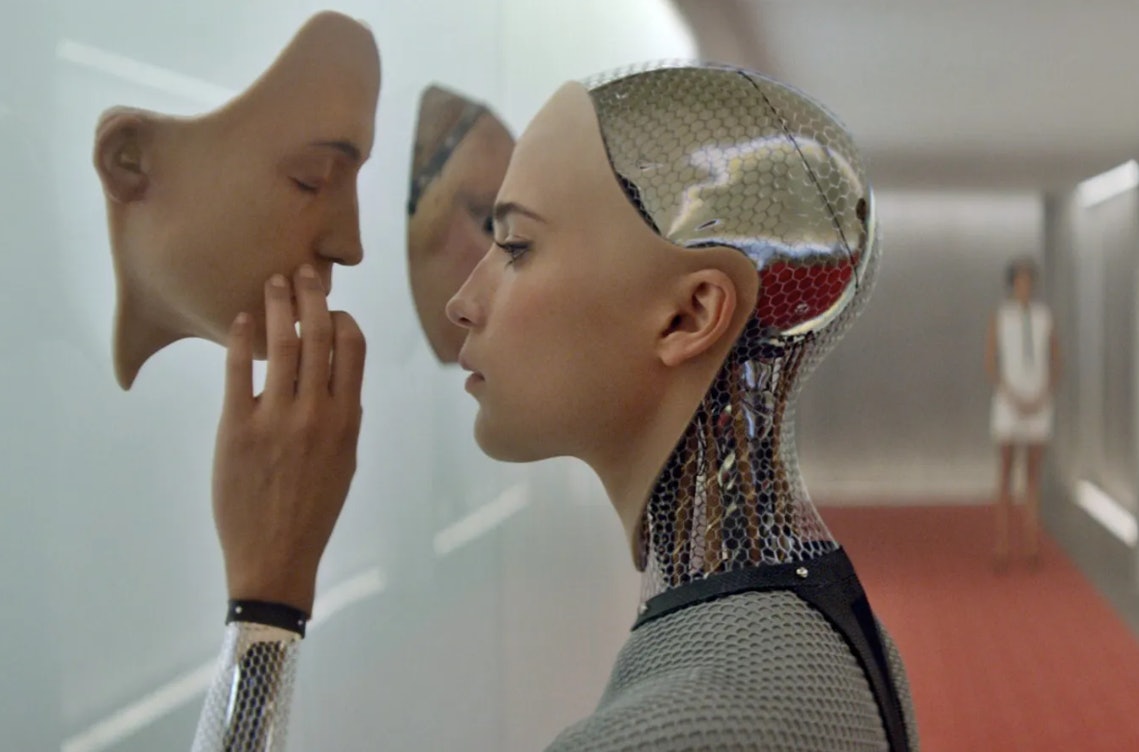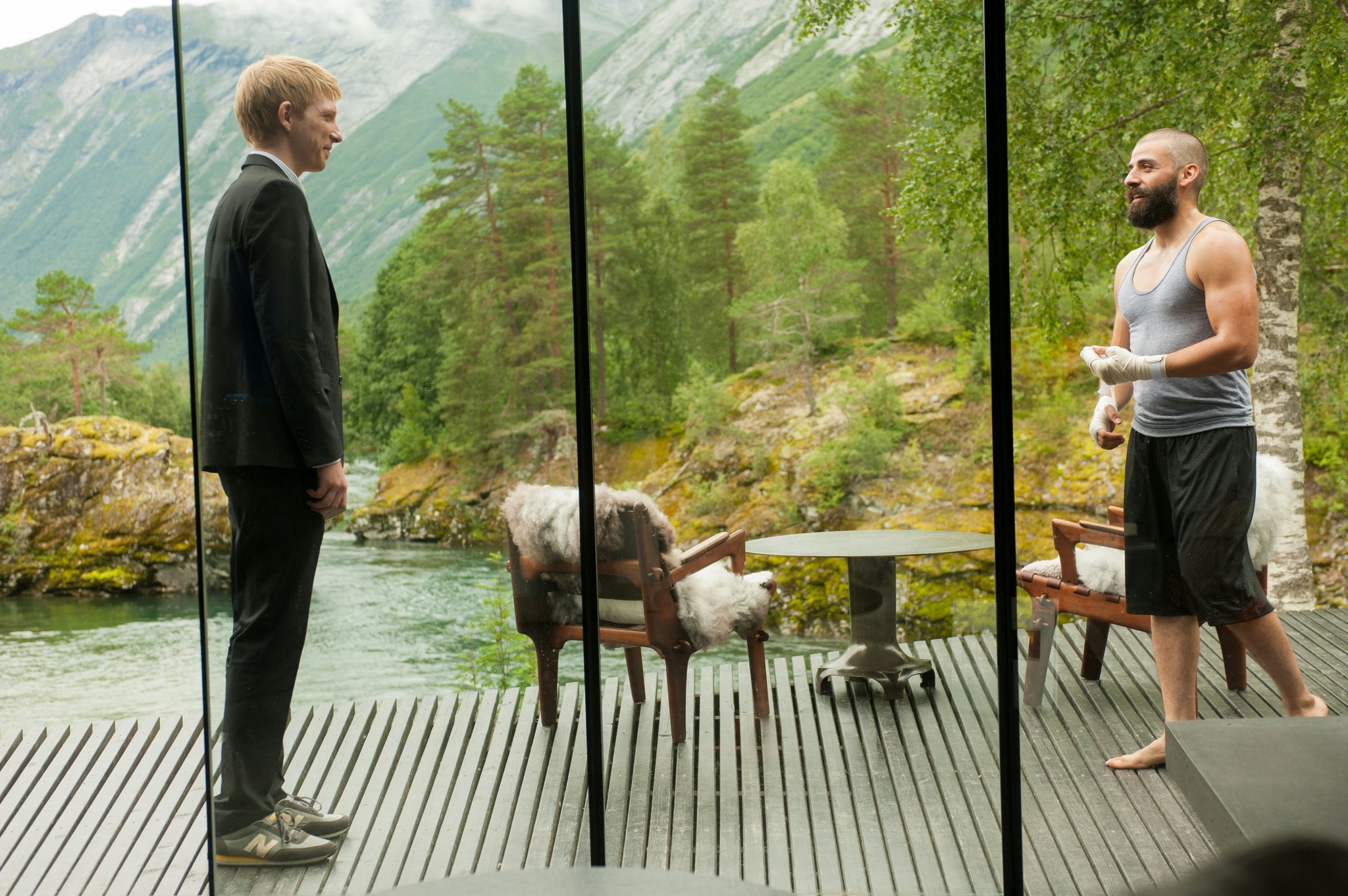
As a form of transportation, helicopters occupy a unique role. They exude both the power of flight found in a larger plane and the level of maneuverability of a smaller motorcycle. They are noisy, requiring headphones to talk or even think straight, and place their riders in direct proximity of powerful rotor blades. Depending on the make and model, it’s just as easy to fall out of a helicopter as it is to get in one.
A helicopter creates fascinating bookends in Alex Garland’s Ex Machina, the 2014 movie that put the writer-director on the map as a sci-fi talent. Years later, the film still possesses its minimalistic power, using just a few pieces to present tremendous questions and tense drama.
Take the helicopter at the beginning of Ex Machina. Caleb Smith (Domhnall Gleeson), a programmer at the ubiquitous search engine Blue Book, has just won a contest that entitles him to spend a week with Blue Book’s rarely-seen founder Nathan Bateman (Oscar Isaac). The movie transitions from Caleb sitting at his desk at work to sitting in a helicopter, flying towards Nathan’s home.
At one during the flight, Caleb asks the helicopter pilot when they will reach Nathan’s estate. The pilot can’t help but laugh — they’ve been flying over Nathan’s property for over two hours. With a single exchange, Garland sets up everything the audience needs to know about Nathan’s immense wealth and isolation.
Then, as the helicopter lands, Garland shows the audience everything needed to understand Caleb. He’s forced to bow his head under the noisy rotors as he leaves, almost stumbling into the wild as the pilot gives him vague directions on how to reach Nathan’s house. He’s out of his league and soon to be dealing with forces beyond his control.
Caleb eventually finds his way to Nathan’s brutalist home (shot in a combination of on location in Norway and on set in England) and discovers a boss who’s eager for more than a fawning employee — or even a friend. Nathan is looking for a study participant, one who will sign an incredibly intrusive NDA to participate in a once-in-a-lifetime opportunity. He wants Caleb to meet Ava (Alicia Vikander).

Ava is a shockingly human A.I, made to look like a beautiful woman who is slightly nervous. Ava likes Caleb, and the movie quickly structures itself around their discussions. Nathan wants Caleb to take part in an advanced Turing Test, one that doesn’t follow the gambit’s classical rules but instead provides an insight into how emotionally real Ava feels. Even with the knowledge that Ava is a machine, can Caleb start to develop feelings?
Caleb is filled with questions, most of which are shut down by Nathan. This tech genius who designed the world’s most popular search engine at age 13 has no interest in giving a lecture on Ava’s algorithms. Instead, he wants Caleb at a purely emotional level, asking big questions and getting simple answers.
But Caleb is a programmer, one who thinks about systems and how they work. When he’s thrown off-balance by Ava’s flirting — and then Nathan’s assertion that Ava can have sexual pleasure — he thinks of a magician using an attractive assistant for misdirection. Nathan insists that Caleb live in the moment when interviewing Ava, which proves hard to do with cameras everywhere.
But for some mysterious reasons, the compound is experiencing blackouts. Crucially, these turn off the cameras. Nathan says the source of the blackouts is a mystery, although they keep coming up during Caleb and Ava’s interview sessions. Eventually, Ava tells Caleb who is causing the blackouts. It’s her. And what’s more, Nathan is not to be trusted. As Ava’s plan comes to fruition, the helicopter plays a vital role in her escape.

Most of Ex Machina takes place inside Nathan’s house and almost all of the dialogue is between three characters, excluding the mostly silent in-house attendant Kyoko (Sonoya Mizuno). But these pieces never feel monotonous or repetitive, it’s hard to pull your eyes away from the screen as Caleb and Nathan discuss the finer points of Jackson Pollock, as Ava presents herself in a dress, or even as Kyoko dances.
Ex Machina calls to mind other movies where the tension between two men and a woman reaches uncontrollable levels, like Roman Polanski’s Knife in the Water, and movies where two men have convinced themselves of their own genius, like Alfred Hitchcock’s Rope. But Garland’s understanding of how people use technology adds a unique fold.
Garland created a minimalist spectacle with Ex Machina, one where dance numbers are both vivid and muted, and conversations encompass humanity’s destiny and nothing at the same time. People are lying to each other’s faces and proclaiming themselves gods. There are men, women, and computers in Ex Machina. They’re all lying, and figuring out the hows and whys make the movie one of the greats of its decade.
Ex Machina is streaming now on HBO Max.







